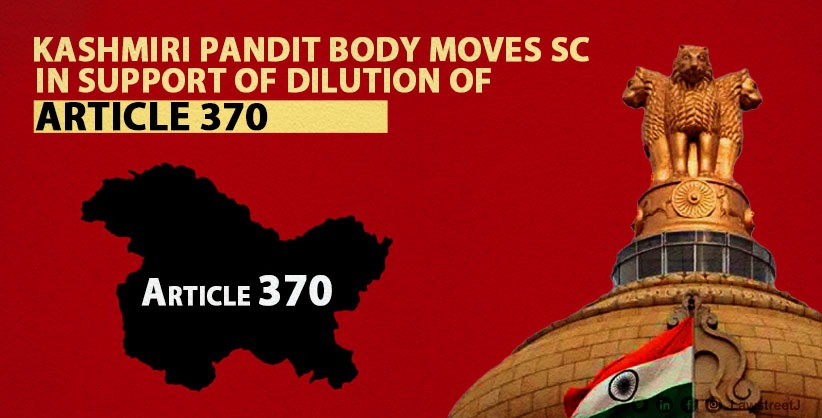NEW DELHI: A Kashmiri pandit organization, Youth 4 Panun Kashmir, on Thursday filed a plea in the Supreme Court supporting the Centres 2019 decision on dilution of Article 370 of the Constitution, contending majority of people in the valley never had faith in the Indian Constitution.
The plea claimed Article 370 and Article 35A of the Constitution became a major reason for eroding the sentiment of Indian identity within the Kashmir Valley.
"The majority of Kashmir valley never had faith in the Indian Constitution and Article 370 and Article 35A of the Indian Constitution helped them in the separatist movement," it said.
The plea filed through advocate Siddharth Praveen Acharya sought dismissal of all petitions challenging the vires of the abrogation of Article 370 and Article 35A of the Constitution of India and Jammu and Kashmir Re-Organization Act, 2019 and declare the decisions as valid and constitutional.
The petitioner stated that they strongly felt that Article 370 and Article 35A were the biggest reason for the lack of psychological integration of the erstwhile State of Jammu & Kashmir with the rest of India and became a breeding ground for separatist ideas leading to the ethnic cleansing of innocent Kashmiri Pandits.
The plea also asked the top court to recognise the atrocities committed against Kashmiri Pandits and the inaction of the central and state governments in this matter.
The petitioner sought to be heard when a five-judge bench led by Chief Justice of India D Y Chandrachud begins hearing a batch of petitions challenging the abrogation of Article 370, which gave special status to Jammu and Kashmir, from August 2.
The plea seeks the dismissal of all petitions challenging the abrogation of Article 370 and the declaration of the step as valid and constitutional.
The application also seeks to draw the attention of the Supreme Court to the violence and atrocities perpetrated upon Kashmiri Pandit Community between the period of 1989-1991 as a direct or indirect consequence of unimpeded powers provided to the Jammu & Kashmir State Government vide Article 370 of the Constitution.
The plea also wants the apex court to take on record the trials and tribulations faced by the Kashmiri Pandit Community in Jammu & Kashmir and the exodus thereof as a matter of history.
The plea highlighted that Article 370 and Article 35A of the Indian Constitution were complex problems with implications for history, the Constitution, politics, society, economy, psychology and the human conditions.
"The erstwhile State of Jammu and Kashmir had become vulnerable to both external aggression and internal rebellion, and Article 370 and Article 35A had significantly contributed to the hostile elements' ability to sow internal unrest and facilitate external aggression," it said.
It also stated that the special status for Jammu and Kashmir by virtue of Article 370 and Article 35A of the Indian Constitution led to ambiguity and complexities in the interpretation and application of certain laws and rights within the region. "This ambiguity undermines the clarity and certainty that the basic structure doctrine seeks to achieve in the Constitution. A constitutionally protected sub-nation poses challenges to the uniformity and consistency of the constitutional framework," it said.
The plea also stated the provision, by establishing a safeguarded entity within the constitutional framework, resulted into erosion of sovereignty, inequality among States, threat to national integration, among others.













